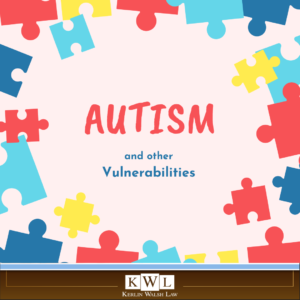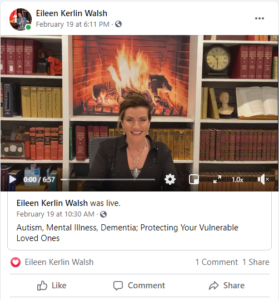This is a privilege, I’ve often said. This viewpoint I have of our human tapestry, sitting with families day after day, talking about intimate aspects of their life. And it’s often a very positive experience, verifying for me that people are generally kind and want the best for each other.
However, I do occasionally see a little bit more sad things, some disturbing patterns that are arising in society. One of those patterns that I’ve seen over the years is the prevalence of vulnerable people in our families’ lives. Between autism in children, mental illness in teens and adults, dementia in seniors, we have a wide swath in our society, in our families, that need help.
 We could Google search and see that one in 54 has autism in the U.S. Dementia figures now are one in five, mental illness one in seven. Those statistics often exist in silos. What I’m seeing is that all three of them together in our society is that almost one in three of our client families needs some sort of special needs Trust planning.
We could Google search and see that one in 54 has autism in the U.S. Dementia figures now are one in five, mental illness one in seven. Those statistics often exist in silos. What I’m seeing is that all three of them together in our society is that almost one in three of our client families needs some sort of special needs Trust planning.
Because we don’t often talk about these subjects, we have no idea how common they are.
With a family member with such a vulnerability, we can be fearful, feel alone, sometimes ashamed, and often overwhelmed. That’s the sad news. But the good news is we can do so much with special needs Trust planning for your vulnerable family member.
Special needs Trusts are a wonderful tool that are blessed by the state and federal government. If that vulnerable adult or child receives state, federal or local benefits, they may be getting food or housing help or Medicaid. If they are receiving those benefits, and you do a simple Will or name them as a beneficiary on your accounts, they will end up with more than they’re allowed, with their income-kept benefit, and possibly an interruption of that really important help that they are receiving.
With special needs Trust planning, we can preserve anything that you have to leave for them, for incremental needs or life enhancements. We make sure that any benefits they’re already receiving for their basic needs are not interrupted or taken away. This makes a massive difference to my clients when they realize that.
Then we have to think about who’s going to take care of our vulnerable loved ones? What’s in the special needs Trust for them? We’ll talk about naming a family member, perhaps a trusted sibling? Would there be resentment of that, or maybe we need to get a professional Trustee and what are the costs? We have to keep in mind that whoever is managing the Trust is going to do that for a long time. We look at them, their life, any vulnerabilities they have, even the possibility of divorce. These Trusts protect the money that may be from the vulnerable person themselves. Perhaps there is a mental illness that led to an addiction, and therefore we have to make sure that their money doesn’t go for anything that would be the last thing you would intend, or that it would hurt them further.
So, we can protect them from themselves with a Trust. We can protect them from predators. Often unfortunately there are hangers-on and those who would abuse the funds of someone who is vulnerable if they don’t have someone to manage that money for themselves. The trustee is really important, as well as the instructions for their care. You know how to take care of your vulnerable family member. We want to make sure your planning instructs someone else how to take care of them. Perhaps most important of all, we want you to do the planning while you’re able.
Some of the saddest scenarios I have seen is an adult with a special needs child, whom they’ve taken care of all their life, worried about what would happen to the child. They don’t get any planning done, and then develop Alzheimer’s or dementia, and now they’re unable to care not only for themselves nor their vulnerable family member. We have no planning done and we have to go to the courts for everything, which is expensive, public and extremely distressing.
Think about your vulnerable family member, know that the special needs Trust planning exists. When I call estate planning “The Healing Law”, this is exactly what I mean. The kind of relief that you feel when you know that your family member is cared for, doesn’t have a price. Make sure you get this planning done. If you don’t get help with me, get help from a good, experienced estate planning attorney.
I will leave you today with the immortal words of Judi Dench in the great “The Best Exotic Marigold Hotel”, “Everything will be alright in the end… and if it’s not all right then it’s not yet the end.”
Thanks for watching, and I will see you next week on Friday’s Fireside Chat.
Click to listen to this replay


